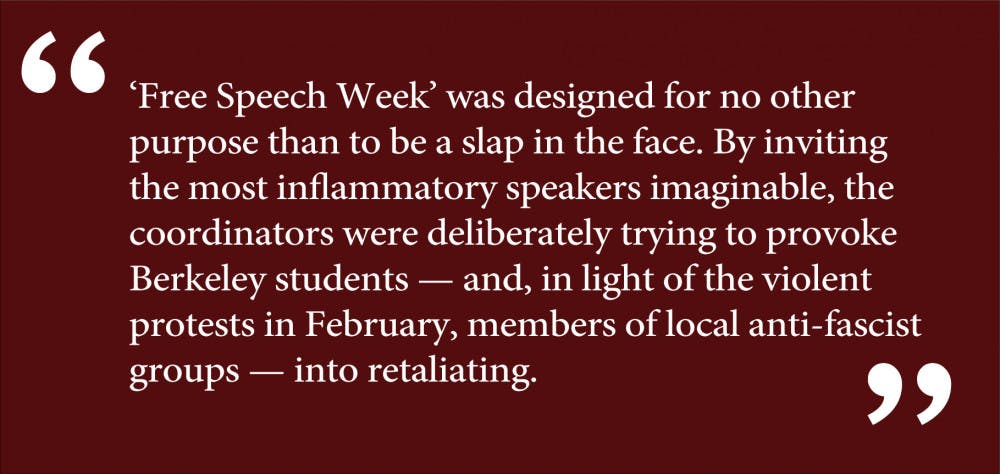Last week, the infamous Free Speech Week at the University of California at Berkeley was officially cancelled. This was not altogether surprising given that it had been poorly organized from the start. The coordinators repeatedly missed deadlines to register their events, failed to book rooms on time and apparently listed several public figures as speakers without their approval. What was surprising, however, was that anyone could believe this travesty of an event was about free speech in the first place.
For those who have wisely steered clear of the news emerging from Berkeley recently, here’s a little context: after protests over right-wing speakers rocked the campus in the spring, a student group called Berkeley Patriot decided to organize a four-day right-wing extravaganza — publicized as the “Coachella of Conservatism” — ostensibly in support of free speech. They invited prominent provocateurs Milo Yiannopoulos, Pamela Geller, Ann Coulter and Steve Bannon to campus to share their controversial views. Needless to say, this did not go over well with the diverse and predominantly liberal Berkeley community — a community that had already experienced violence on their doorsteps after protests disrupted a scheduled Yiannopoulos talk in February.
The campus had been gearing up for the week — and the inevitable demonstrations that would have followed — when news emerged that Berkeley Patriot had cancelled the event. This led to immediate backlash from right-wing supporters who accused Berkeley of shutting down free speech. Yiannopoulos, who worked with the student organizers to host the event, boldly accused the university administration of doing “everything in its power to crush its own students’ aspirations.”
Let’s set aside the fact that the event seems to have been cancelled because of the incompetence of its organizers. This criticism rests on the assumption that Free Speech Week was actually about, well, free speech. It wasn’t.
If the rally were indeed about promoting free and open discourse on college campuses, the organizers wouldn’t have only invited speakers from the far right. They wouldn’t have organized a campus-wide festival without significant student input or buy-in. They wouldn’t have been so secretive about their event planning and logistics. And they wouldn’t have chosen a figure as polarizing as Yiannopoulos to be the public face of the event.
Free Speech Week was designed for no other purpose than to be a slap in the face. By inviting the most inflammatory speakers imaginable, the coordinators were deliberately trying to provoke Berkeley students — and, in light of the violent protests in February, members of local anti-fascist groups — into retaliating. Inciting a strong response would embellish the reductive narrative that liberal students are at war with free speech — a narrative that has proven remarkably effective with conservatives thus far.
It is also no coincidence that the organizers chose to target Berkeley, one of the most diverse campuses in the country. Approximately 18 percent of its undergraduate students are from underrepresented groups and 29 percent are first-generation students. The university has a large number of undocumented students as well. On the other hand, many of the invited speakers have built their brands on race-baiting, xenophobia and anti-immigrant rhetoric. With this in mind, it is clear the speakers weren’t just seeking a platform to share their views — they were seeking one with the greatest potential to isolate and divide. In some ways, they were successful: many students, particularly students of color, reported feeling unsafe and unwelcome on the campus in the lead-up to the event.
Nor did the event’s substance seem worthy of its extravagant cost. Berkeley expected to spend as much as $1 million, including at least $300,000 to not only “protect the speakers but also to protect the value of free speech,” according to President of the University of California Janet Napolitano. These funds — an enormous outlay for an already debt-burdened campus — could have easily been used to bring in conservative speakers with more expertise and knowledge. And this doesn’t even account for the costs of campus disruption: Prominent academics like anthropologist Anna Tsing had to reschedule their visits to Berkeley in light of the event. So would Free Speech Week have fostered freedom of expression or undercut constructive dialogue in favor of provocation for provocation’s sake? I suspect the latter.
Don’t get me wrong: I absolutely believe that free speech is worth promoting on college campuses. According to a new study from the Brookings Institution, over 40 percent of college students seem to misunderstand the First Amendment. This does not bode well for dialogue and diversity of opinion on campuses, and universities should work to address this. But stunts like Berkeley’s Free Speech Week only undermine that cause.
Still, there might actually be one positive thing to come out of the event: Yiannopoulos and his crew of misfits just showed the country what not to do when standing up for freedom of expression. Here’s hoping they learn from it.
Mili Mitra ’18 can be reached at mili_mitra@brown.edu. Please send responses to this opinion to letters@browndailyherald.com and other op-eds to opinions@browndailyherald.com.





